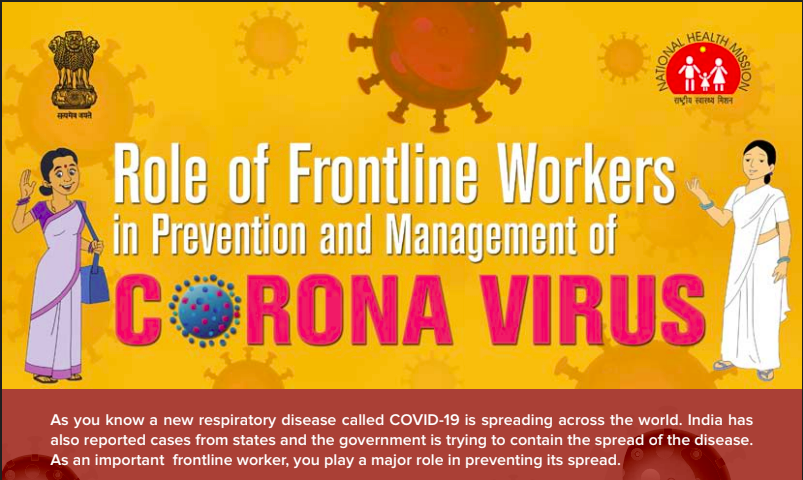As you know a new respiratory disease called COVID-19 is spreading across the world. India has also reported cases from states and the government is trying to contain the spread of the disease. As an important frontline worker, you play a major role in preventing its spread.
Your Role as a Frontline Worker is two-fold:
1. Spread key messages in the community about measures to prevent the infection.
2. Take actions for early detection and referral of suspected COVID-19 cases.
As a key member of the primary health care team, we want you and your family to be safe. Following the advice in this document will help you in staying safe.
What is COVID-19?
COVID-19 is a disease caused by the “novel corona virus”.
Common symptoms are:
- Fever
- Dry cough
- Breathing difficulty
- Some patients also have aches and pains, nasal congestion, runny nose, sore throat or diarrhoea
About 80% of confirmed cases recover from the disease without any serious complications. However, one out of every six people who gets COVID-19 can become seriously ill* and develop difficulty in breathing. In more severe cases, infection can cause severe pneumonia and other complications which can be treated only at higher level facilities (District Hospitals and above). In a few cases it may even cause death.
How does COVID-19 spread?
COVID-19 spreads mainly by droplets produced as a result of coughing or sneezing of a COVID-19 infected person. This can happen in two ways:
Direct close contact: one can get the infection by being in close contact with COVID-19 patients (within one Metre of the infected person), especially if they do not cover their face when coughing or sneezing.
Indirect contact: the droplets survive on surfaces and clothes for many days. Therefore, touching any such infected surface or cloth and then touching one’s mouth, nose or eyes can transmit the disease.
The incubation period of COVID 19 (time between getting the infection and showing symptoms) is 1 to 14 days
Some people with the infection, but without any serious symptoms can also spread the disease.
Which group of people are at higher risk of getting infected?
- People who have travelled to other countries in last 14 days and their family members.
- People coming from other states if they have been working with people who travelled to other countries in last 14 days.
- Family members and contacts of patients confirmed to have COVID-19.
- People older than 60 years of age and people with medical problems like high blood pressure, heart problems, respiratory disease/asthma, cancer or diabetes are at higher risk for developing serious complications.
How to take care of yourself and carry on with your duties as a frontline worker?
- Take all preventive measures that you are talking about in the community such as keeping safe distance, washing hands frequently including before and after home visits. Carry your own soap if necessary
- If you are visiting or accompanying a suspected case to any health facility, make sure to cover both your mouth and nose with folded cloth or mask.
- If you are conducting community meetings or supporting outreach sessions the groups should not be larger than 10-12 people.
- Maintaining safe distances for those living in crowded areas or the homeless is going to be difficult. Even then you should inform them about preventive measures and support them as required.
- Self-monitor for signs of illness and report to the Medical Officer, immediately if any symptoms develop. Ensure that you continue to undertake tasks related to care of pregnant women, newborns and sick children, Post Natal Care, Breastfeeding and Nutritional Counselling, TB and NCD patient follow up while taking preventive measures.
- Remember older people are at higher risk, so take special care to visit homes of elderly people.
- Continue to pay special attention to the marginalized, as is your routine practice.
- Also as the people’s trusted health worker, try to reassure them that while those with symptoms and high risk need close attention, for others, prevention measures will decrease the risk of getting the disease.
- NATIONAL HEALTH MISSIO N Ministry of Health & Family Welfare Government of India Myths vs. reality for COVID-19
